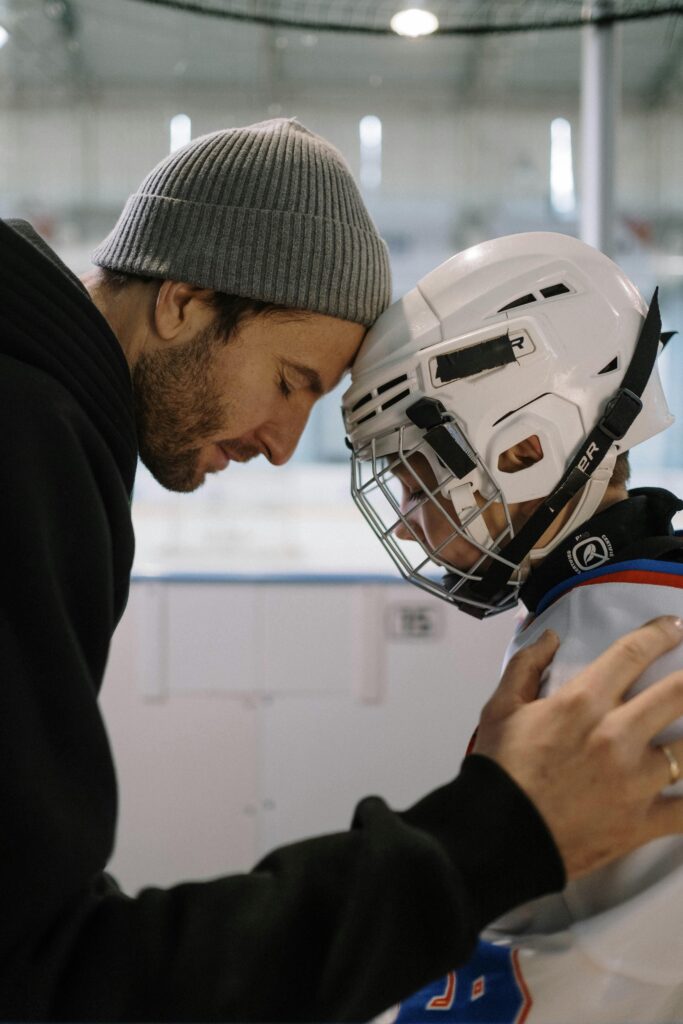As a hockey parent, I was shocked to learn that 70% of young athletes drop out of sports by age 13, often due to stress and anxiety. It hit close to home, watching my own son navigate the highs and lows of youth hockey. That’s why I’m sharing what I’ve learned about helping our young players handle wins, losses, and performance anxiety. Trust me, it’s not just about improving their game; it’s about ensuring they continue to love the sport we’ve invested so much in. Let’s explore some practical strategies to help our kids build mental toughness, embrace challenges, and truly enjoy their time on the ice!

Understanding the Mental Game in Youth Hockey
As parents, we often focus on our kids’ physical skills, but I’ve come to realize that hockey is as much a mental game as it is physical. Mental toughness isn’t just a buzzword – it’s like a secret weapon that can give our children an edge on the ice and in life.
I’ve seen firsthand how pre-game jitters, fear of making mistakes, or feeling down after a tough loss can affect our young players. But here’s the exciting part: we can help shape their mental state, which directly impacts their performance and enjoyment of the game.
Think of your child’s mindset as their personal locker room. Our job is to help them keep it tidy and positive, so they’re ready to give their best on the ice. Remember, we’re not just cheering from the sidelines – we’re the mental game coaches our kids need.
Strategies for Handling Wins Gracefully
There’s nothing quite like seeing the joy on our kids’ faces after a big win. It’s important to let them celebrate – they’ve earned it! But as parents, we also play a crucial role in teaching them how to handle success with grace. Here’s what I’ve learned:
- Encourage them to enjoy the moment, but gently remind them that there’s always room for improvement.
- After each win, I like to ask my son, “What did you do well, and what do you think you could do even better next time?” This keeps them grounded and focused on growth.
- Use that winning energy as motivation for the next practice. I often say, “Great game! I can’t wait to see how you’ll build on this in practice.”
- Always model and encourage respect for opponents. I remind him that the way he conducts himself after a win is as important, if not moreso, than a loss.
Coping with Losses and Setbacks
Let’s be honest – it’s heart-wrenching to see our kids upset after a loss. But I’ve learned that these moments are golden opportunities for building resilience. Here’s how we can help:
- Frame losses as learning experiences. I often ask, “What did you learn from this game that can make you a better player?”
- Build their resilience muscle. Remind them that setbacks make them stronger. I like to share stories of professional players who overcame adversities.
- After a tough game, try this: have your child name three things that went well, no matter how small. It shifts their perspective from failure to progress.
- Help keep the team’s spirit high. Encourage your child to support their teammates. A positive attitude is contagious!
Tackling Performance Anxiety Head-On
Seeing our kids nervous before a big game can make us anxious too! But I’ve found that performance anxiety is normal and manageable. Here’s how we can help:
- Help your child identify what makes them nervous. Is it the crowd? The opposing team? Once they know, you can work together on solutions.
- Try this visualization technique: have your child close their eyes and imagine playing an awesome game. It really works!
- Emphasize the importance of practice. I often say, “The more prepared you are, the more confident you’ll feel.”
- Teach them to reframe nerves as excitement. I remind my child, “Those butterflies mean you care about doing well!”
Building a Supportive Team Environment
Hockey is a team sport, and I’ve seen how a strong team can boost individual performance. Here’s how we can encourage a positive team culture:
- Model positive communication. When we speak well of teammates, coaches, and opponents, our kids follow suit.
- Encourage trust-building. Tell your child: “Having your teammates’ backs means they’ll have yours too.”
- Support team-building activities off the ice. I’ve found that the closer the kids are as friends, the better they play together.
- Help keep the pre-game atmosphere light. Sometimes, a good laugh before the game can ease everyone’s nerves!
The Role of Goal-Setting in Mental Toughness
Goal-setting isn’t just for adults – it’s a powerful tool for our young players too. Here’s how we can guide them:
- Introduce SMART goals: Specific, Measurable, Achievable, Relevant, and Time-bound. Instead of “I want to be a better player,” encourage something like “I’ll improve my shot accuracy by 10% this month.”
- Focus on process goals, not just outcomes. “I’ll practice my slapshot for 15 minutes every day” is more helpful than “I’ll score in every game.”
- Celebrate small wins along the way. Did they improve their speed by a fraction? That’s worth a high-five!
- Help them adjust goals as they grow. Keep challenging them, but ensure the goals remain achievable.
Mindfulness and Focus Techniques for Young Players
Mindfulness has been a game-changer for my young player. Here are some techniques we use:
- Try this quick mindfulness exercise together: for 30 seconds, focus only on the feeling of your feet on the ground (or skates on the ice).
- Help them develop a pre-game routine. It could be as simple as listening to a favorite song or doing a specific warm-up.
- Teach deep breathing for stress management. We practice counting to four for inhale, hold, and exhale.
- Encourage staying present. I often remind my child, “Focus on this shift, this play, this moment. That’s all that matters right now.”
As parents, we play a crucial role in helping our young hockey players develop mental toughness. By guiding them through wins, losses, and performance anxiety, we’re not just raising better athletes – we’re raising resilient, confident individuals.
Remember, every great player faced challenges, and it’s how they handle them that sets them apart. So the next time your child steps onto the ice, remind them to take a deep breath, trust their training, and play their heart out. They’ve got this – and with your support, they’ll not only survive but thrive in the exciting world of youth hockey. Now, let’s head to the rink and cheer on our amazing kids!
